School Solutions
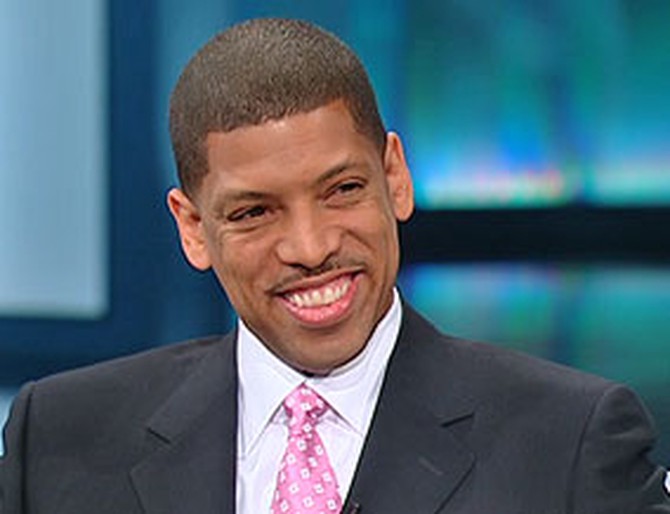
In Part 1 of our report, Bill and Melinda Gates highlighted some of the biggest problems facing America's schools—obsolete education, high dropout rates and underperforming graduates. With the help of former basketball all-star and education advocate Kevin Johnson, they have launched a new campaign, Stand Up, to address the crisis.
While playing for the Phoenix Suns, Kevin took his team to the playoffs 10 years in a row. During the NBA off-season, Kevin returned to his hometown of Sacramento, California, to make a difference. He saw that life in his old neighborhood was still a struggle.
To combat the influences of drugs, jail and unemployment on kids in Sacramento, Kevin opened an after-school program called St. Hope Academy designed to keep high-risk kids off the streets. During his time off, he routinely spent 12 hours a day, six days a week working at St. Hope. He quickly realized this was his true calling.
In 2000 Kevin retired to focus on education. "I couldn't wait to get out of the game so that I could do something bigger and more important than basketball," he says. He now works full-time running the six schools that make up the St. Hope Public School System in Sacramento.
While playing for the Phoenix Suns, Kevin took his team to the playoffs 10 years in a row. During the NBA off-season, Kevin returned to his hometown of Sacramento, California, to make a difference. He saw that life in his old neighborhood was still a struggle.
To combat the influences of drugs, jail and unemployment on kids in Sacramento, Kevin opened an after-school program called St. Hope Academy designed to keep high-risk kids off the streets. During his time off, he routinely spent 12 hours a day, six days a week working at St. Hope. He quickly realized this was his true calling.
In 2000 Kevin retired to focus on education. "I couldn't wait to get out of the game so that I could do something bigger and more important than basketball," he says. He now works full-time running the six schools that make up the St. Hope Public School System in Sacramento.
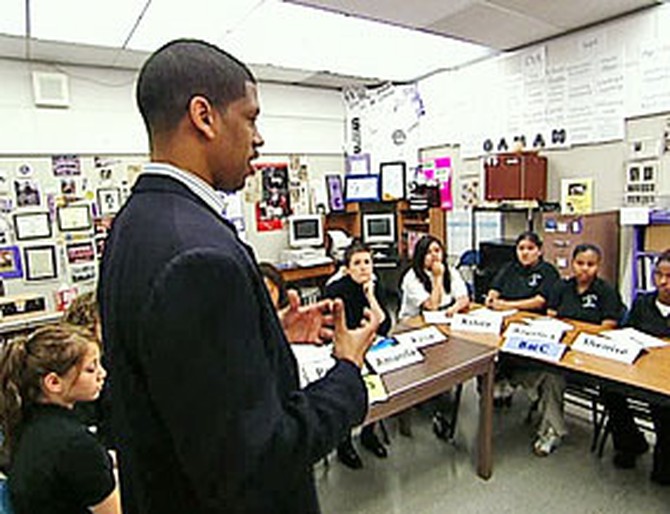
In this new role, Kevin's biggest concern is getting his students on track to go to college. "You know what [kids] want more than anything? They just want to feel special," he says. "They just want somebody to know their name. They want somebody to take some time with them, ask them where they're going to college."
Just as important as motivating the students, Kevin says, is motivating their parents. St. Hope involves them the old-fashioned way—through regular face-to-face meetings. "If a parent does not want their son or daughter to go to college and if they're not willing to do whatever it is to help their son or daughter get there, this is not the school for you," Kevin says. "This is not the choice that you should make."
Just as important as motivating the students, Kevin says, is motivating their parents. St. Hope involves them the old-fashioned way—through regular face-to-face meetings. "If a parent does not want their son or daughter to go to college and if they're not willing to do whatever it is to help their son or daughter get there, this is not the school for you," Kevin says. "This is not the choice that you should make."

The St. Hope Public School System now expects more from its students, teachers and families. Kevin says that without these changes, neighboring communities would have felt very negative consequences. "We all know the story—your crime rate goes up, your unemployment goes up, your dropout rate goes up," he says.
Kevin says that reform is not only about economics. There is also a moral implication. "Our work is not just about high school and education," he says. "It's about transformation. Education is supposed to be the great equalizer for us all."
"We have a national crisis going on. We want to get into the psyche of America so everyone understands that there has to be a national dialogue," he says. "The Stand Up campaign stands for awareness. We want to demand that all of our high schools graduate kids who are ready for college, work, and beyond."
Kevin says that reform is not only about economics. There is also a moral implication. "Our work is not just about high school and education," he says. "It's about transformation. Education is supposed to be the great equalizer for us all."
"We have a national crisis going on. We want to get into the psyche of America so everyone understands that there has to be a national dialogue," he says. "The Stand Up campaign stands for awareness. We want to demand that all of our high schools graduate kids who are ready for college, work, and beyond."
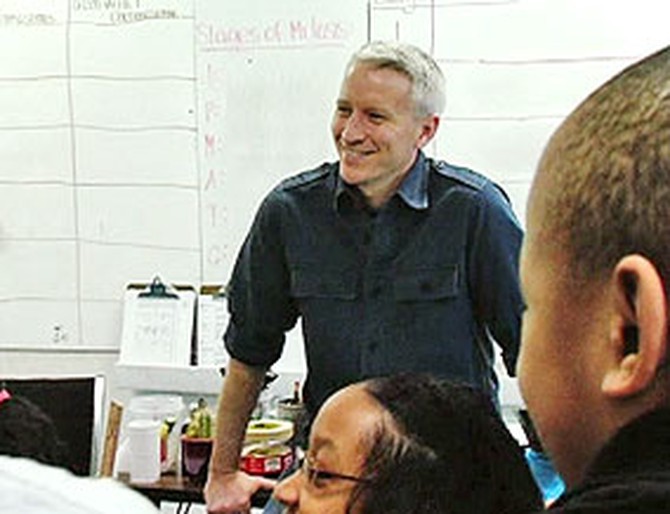
In Washington, D.C., CNN's Anderson Cooper found a school that has turned students' lives around. "Most of these kids were two grades behind when they transferred here from some of the lowest performing schools in the country," he says. "Now they're outscoring every public middle school in Washington."
The school is called KIPP—short for Knowledge Is Power Program—part of a growing network of schools around the country. It's the brainchild of Mike Feinberg and Dave Levin, two Ivy League grads and Teach for America alumni who thought they could do a better job than the public school system.
Now with 46 KIPP schools across the country, they're out to prove that they are right.
The school is called KIPP—short for Knowledge Is Power Program—part of a growing network of schools around the country. It's the brainchild of Mike Feinberg and Dave Levin, two Ivy League grads and Teach for America alumni who thought they could do a better job than the public school system.
Now with 46 KIPP schools across the country, they're out to prove that they are right.
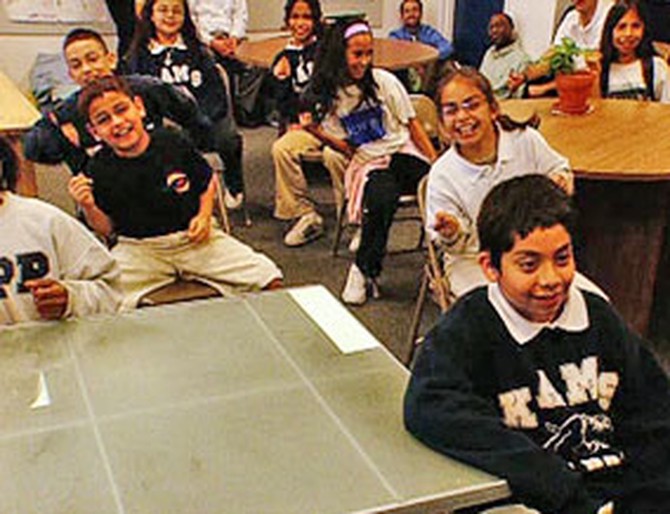
Part of KIPP's success is attained through the setting of high expectations. The school day starts at 7 a.m. and doesn't end until 5 p.m. Students are assigned at least three hours of homework every night. There are also Saturday half-days and mandatory summer school.
So why are the students so eager to enroll? After just a few minutes in a KIPP classroom—with students using songs to learn subjects like state capitals and multiplication tables—Anderson says it's obvious that this school isn't like any others. "The KIPP style of teaching sets facts and figures to music," he says. "The three R's here are repetition, rhythm and rap."
That's a big part of the KIPP philosophy. "We felt like we could make learning fun and we could get kids to come to school and they would not want to go home," Dave says.
Mike and Dave say they got the idea for this style of learning from a teacher named Harriett Ball whom they met in an inner city public school. "Harriet Ball was kind of like a rock star of teaching in the elementary school I was in," Dave says. "She came into my room and in one day—in 45 minutes—taught what I had failed to teach in three months."
How quickly do the students take to this new approach to learning? "By lunchtime on Day One," Mike says.
So why are the students so eager to enroll? After just a few minutes in a KIPP classroom—with students using songs to learn subjects like state capitals and multiplication tables—Anderson says it's obvious that this school isn't like any others. "The KIPP style of teaching sets facts and figures to music," he says. "The three R's here are repetition, rhythm and rap."
That's a big part of the KIPP philosophy. "We felt like we could make learning fun and we could get kids to come to school and they would not want to go home," Dave says.
Mike and Dave say they got the idea for this style of learning from a teacher named Harriett Ball whom they met in an inner city public school. "Harriet Ball was kind of like a rock star of teaching in the elementary school I was in," Dave says. "She came into my room and in one day—in 45 minutes—taught what I had failed to teach in three months."
How quickly do the students take to this new approach to learning? "By lunchtime on Day One," Mike says.
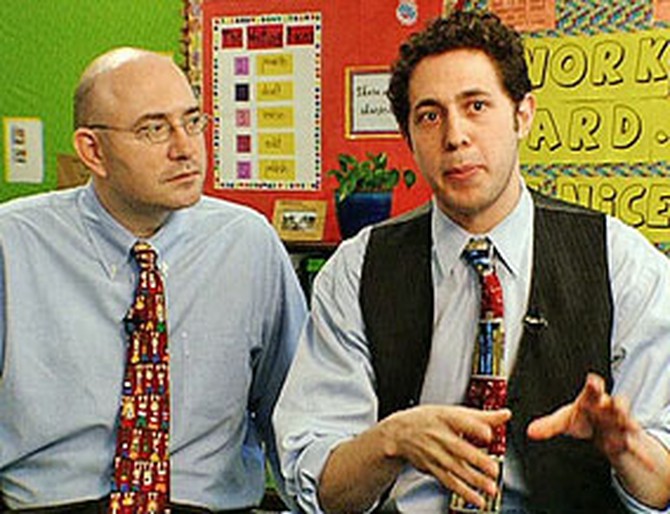
Mike and Dave say that KIPP has a "whatever it takes" philosophy. "Every day the kids come to school with 101 reasons why they're set up for failure, which means we need at least 101 solutions for how to set them for success day in and day out," Mike says.
The founders of KIPP say the "blame game" is too much of a default among the parties in education. "Parents blaming teachers, teachers blaming parents, colleges blaming high schools, high schools blaming middle schools, middle schools blaming elementary schools," Dave says. "Until we all unite around what works and stop accepting failure, we're not going to solve it."
At KIPP, everyone knows they are on the same mission. In fact, the first meeting between parents and teachers takes place in the students' homes. "It makes a huge difference for the teachers and the parents," Dave says. "There's traditionally a separation between school and home. And when it stops being separated like that, people really start to work together."
Since their education style works so well, why couldn't it work in every school? "That's what everyone gets around to asking us. 'If you guys are doing this, why isn't everyone else doing this?'" Dave says.
The founders of KIPP say the "blame game" is too much of a default among the parties in education. "Parents blaming teachers, teachers blaming parents, colleges blaming high schools, high schools blaming middle schools, middle schools blaming elementary schools," Dave says. "Until we all unite around what works and stop accepting failure, we're not going to solve it."
At KIPP, everyone knows they are on the same mission. In fact, the first meeting between parents and teachers takes place in the students' homes. "It makes a huge difference for the teachers and the parents," Dave says. "There's traditionally a separation between school and home. And when it stops being separated like that, people really start to work together."
Since their education style works so well, why couldn't it work in every school? "That's what everyone gets around to asking us. 'If you guys are doing this, why isn't everyone else doing this?'" Dave says.
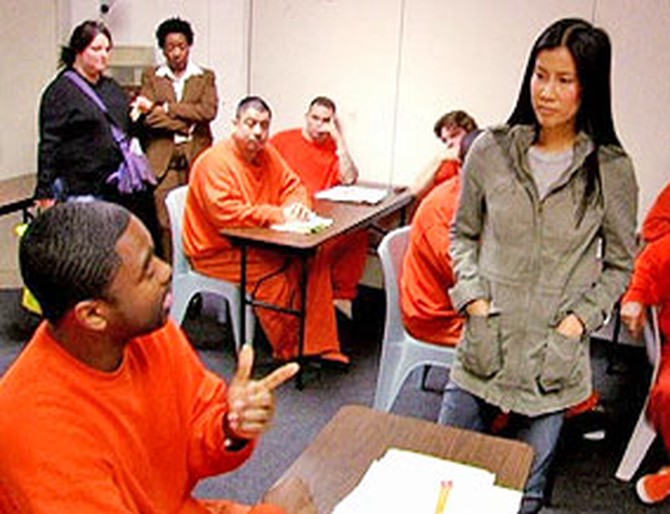
According to the Bill and Melinda Gates Foundation, a high school dropout is eight times more likely to end up in jail than a high school graduate. Lisa Ling goes behind bars at a San Francisco jail to find out what can happen to children when America's educational system fails them.
At this prison facility, Lisa learns that 75 percent of the inmates are dropouts. One prisoner says he quit school when he was just 12 years old. For most of these men and women, their education ended more than a decade ago...but that's about to change.
Sunny Schwartz, an attorney who has worked in the San Francisco County Jail system for more than 20 years, is spearheading the first high school for adults behind bars. "We have to interrupt that cycle of violence," she says. "We have to hold them accountable by teaching them how to read."
Inmates also learn life lessons through algebra. One man uses a mathematical formula to calculate that he's spent 44 percent of his life behind bars or on drugs. He's only 29 years old.
What would these men be doing if they weren't enrolled in Sunny's school? "I would be here learning how to become a better criminal," an inmate says.
At this prison facility, Lisa learns that 75 percent of the inmates are dropouts. One prisoner says he quit school when he was just 12 years old. For most of these men and women, their education ended more than a decade ago...but that's about to change.
Sunny Schwartz, an attorney who has worked in the San Francisco County Jail system for more than 20 years, is spearheading the first high school for adults behind bars. "We have to interrupt that cycle of violence," she says. "We have to hold them accountable by teaching them how to read."
Inmates also learn life lessons through algebra. One man uses a mathematical formula to calculate that he's spent 44 percent of his life behind bars or on drugs. He's only 29 years old.
What would these men be doing if they weren't enrolled in Sunny's school? "I would be here learning how to become a better criminal," an inmate says.
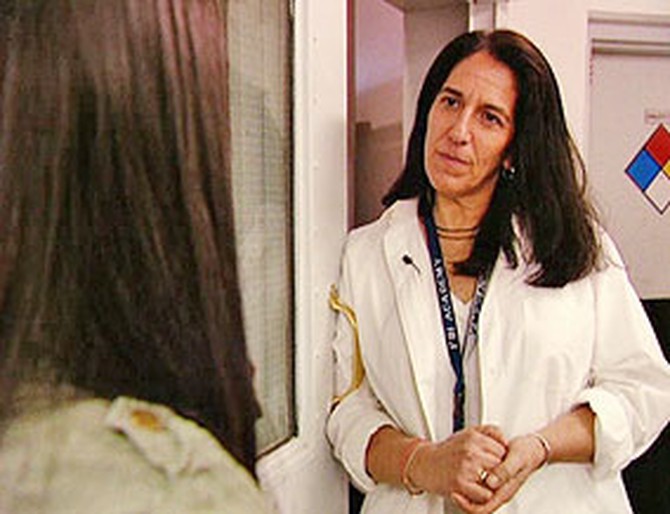
Each year, California spends more than $34,000 to keep one prisoner behind bars, Sunny says. That's three times more than the state spends on each student enrolled in public school per year.
Sunny says San Francisco has identified four or five "feeder" high schools in the city that produce 75 percent of inmates. "These [schools] are profoundly understaffed and underfunded," she says. "It's basic human physics. You expect little...you get little."
With more than 600,000 people getting out of jail every year, Sunny says it's important to understand who's returning to your community. According to her research, 80 percent of inmates have a reading level between third and seventh grade; 90 percent are parents; and 90 percent are survivors of childhood sexual or physical abuse. Sunny says she hopes that her adult high school prepares these inmates to return to society as better people, instead of better predators.
"We hope that the KIPP schools and Kevin Johnson's school puts us out of business in law enforcement," Sunny says.
Sunny says San Francisco has identified four or five "feeder" high schools in the city that produce 75 percent of inmates. "These [schools] are profoundly understaffed and underfunded," she says. "It's basic human physics. You expect little...you get little."
With more than 600,000 people getting out of jail every year, Sunny says it's important to understand who's returning to your community. According to her research, 80 percent of inmates have a reading level between third and seventh grade; 90 percent are parents; and 90 percent are survivors of childhood sexual or physical abuse. Sunny says she hopes that her adult high school prepares these inmates to return to society as better people, instead of better predators.
"We hope that the KIPP schools and Kevin Johnson's school puts us out of business in law enforcement," Sunny says.
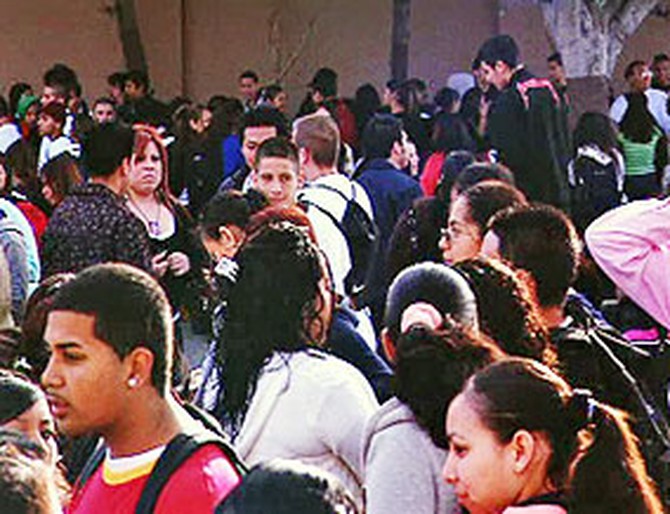
When the school bell rings at one Los Angeles high school, it's rush hour for the 5,000 students who are squeezed into a space built for 1,800 students.
"I have to rush to my classes because if I don't get there on time, I don't get a seat," says Crystal, a 17-year-old senior. "There are people sitting on the teacher's desk. That's not right."
Susanna, who teaches Spanish, says she has 45 students in her class...but only 38 desks. "I think these kids are being cheated," she says.
For Gillian, a teacher who has been at this school for five years, each day feels like a losing battle. "The real crime is that I can't give each one of [my students] the help that they need," Gillian says. "To expect 40 students to all get the education they deserve, it's not going to be able to happen."
The Los Angeles school district recently started a program called Project Diploma to try to prevent students from dropping out, and they say plans to build and repair hundreds of schools are now underway.
"I have to rush to my classes because if I don't get there on time, I don't get a seat," says Crystal, a 17-year-old senior. "There are people sitting on the teacher's desk. That's not right."
Susanna, who teaches Spanish, says she has 45 students in her class...but only 38 desks. "I think these kids are being cheated," she says.
For Gillian, a teacher who has been at this school for five years, each day feels like a losing battle. "The real crime is that I can't give each one of [my students] the help that they need," Gillian says. "To expect 40 students to all get the education they deserve, it's not going to be able to happen."
The Los Angeles school district recently started a program called Project Diploma to try to prevent students from dropping out, and they say plans to build and repair hundreds of schools are now underway.
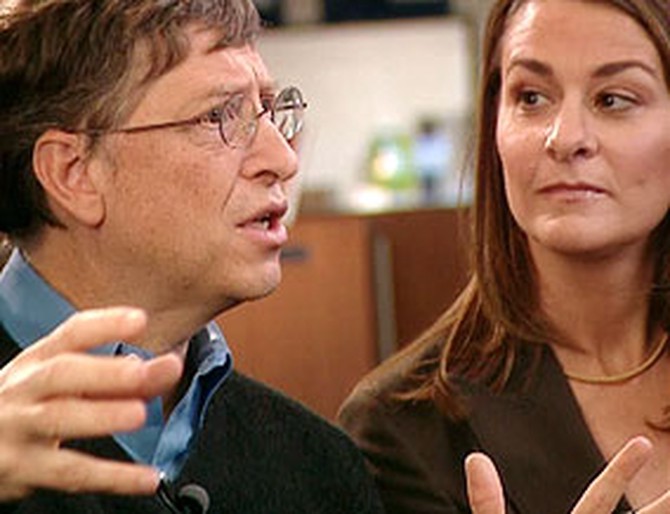
Bill and Melinda Gates have a solution for overcrowded classrooms. They say students will be more successful if large schools are divided into separate, smaller schools.
"I think the worst is when you're in a high school, and you get a sense that people just aren't connected," Bill says. "Maintaining order is the main thing that's happening [at large schools]—it's not really about education."
Good schools aren't judged solely on reading, writing and arithmetic anymore—Bill and Melinda's foundation has reinvented the "three Rs."
"It was all about this rigorous curriculum that was relevant to the children's lives so they stayed interested, and they had a relationship with at least one, if not several, adults in the school," Melinda says. "Those were our 'three R's'—rigor, relationships and relevance."
A group of students taking part in a small school experiment say that at their new schools, teachers and administrators know them by name. "There's not enough room [for us] to fall through the cracks," one student says.
"I think the worst is when you're in a high school, and you get a sense that people just aren't connected," Bill says. "Maintaining order is the main thing that's happening [at large schools]—it's not really about education."
Good schools aren't judged solely on reading, writing and arithmetic anymore—Bill and Melinda's foundation has reinvented the "three Rs."
"It was all about this rigorous curriculum that was relevant to the children's lives so they stayed interested, and they had a relationship with at least one, if not several, adults in the school," Melinda says. "Those were our 'three R's'—rigor, relationships and relevance."
A group of students taking part in a small school experiment say that at their new schools, teachers and administrators know them by name. "There's not enough room [for us] to fall through the cracks," one student says.
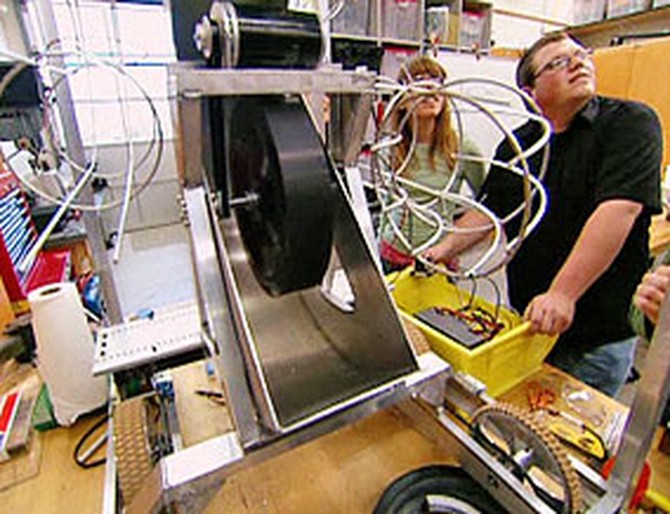
Breaking up large schools into smaller schools is one solution for the American education crisis, but Bill and Melinda say some schools are simply obsolete. An experimental high school in San Diego is reinventing the way students learn and preparing children for the technological age.
High Tech High is unlike any high school Oprah says she's ever seen. As she walks through the halls with Bill and Melinda, she doesn't see a single book. At this school, laptops and hands-on projects have replaced textbooks and traditional lectures.
Nearly 100 percent of High Tech High's graduates go on to college. "Everyone should want their kids to go to a high school like this," says Bill, who has spent millions to create more schools like High Tech High across the country.
High Tech High is unlike any high school Oprah says she's ever seen. As she walks through the halls with Bill and Melinda, she doesn't see a single book. At this school, laptops and hands-on projects have replaced textbooks and traditional lectures.
Nearly 100 percent of High Tech High's graduates go on to college. "Everyone should want their kids to go to a high school like this," says Bill, who has spent millions to create more schools like High Tech High across the country.

Oprah hopes that spotlighting America's educational crisis motivates Americans to join Bill and Melinda Gates's nationwide campaign, Stand Up.
"I've often said that I believe that education is freedom," Oprah says. "And if it is freedom, indeed, then we are literally imprisoning America's future. We all have to demand more from our local, our state, our national leaders...and more from ourselves as citizens, because this is a crisis. And this crisis is going to affect every single one of us."
For more information on Stand Up and how you can help improve schools, visit StandUp.org.
"I've often said that I believe that education is freedom," Oprah says. "And if it is freedom, indeed, then we are literally imprisoning America's future. We all have to demand more from our local, our state, our national leaders...and more from ourselves as citizens, because this is a crisis. And this crisis is going to affect every single one of us."
For more information on Stand Up and how you can help improve schools, visit StandUp.org.
Published 04/12/2006

